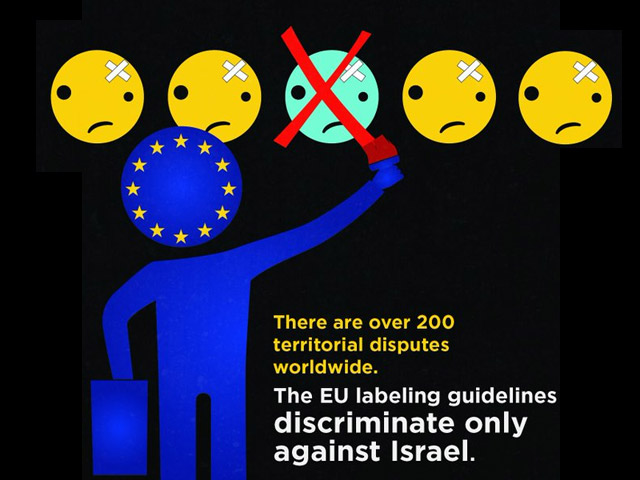8 facts to know about EU Labeling Guidelines
-
-
11/13/2015
-
-

 There are over 200 territorial disputes worldwide. The EU labeling guidelines discriminate only against Israel.
There are over 200 territorial disputes worldwide. The EU labeling guidelines discriminate only against Israel.
|
GovXContentSection
1. Whereas the labeling guidelines are presented by the EU as a purely "technical measure" designed to protect European consumers, there is no doubt that the main purpose of the measure is to exert political pressure upon Israel. As the preparation of the labeling guidelines has been pending for more than three years, the recent adoption begs the question why the EU decided that it should be done now.
2. It is intolerable that Israel is the only country that has been singled out by the EU for such a policy, despite the fact that there are over 200 disputed territories worldwide.
3. These measures are discriminatory in nature and might be perceived as a trade barrier.
4. It is very surprising that in these times of extreme turmoil and instability in the Middle East while Israel is targeted by a wave of terrorism, the EU finds it appropriate to adopt highly political and controversial one-sided guidelines targeting Israel, the only stable democracy in the region.
5. As a matter of fact, the labeling guidelines initiative is being promoted by anti-Israel organisations and not by European consumers-protection organisations. The labeling guidelines might encourage the idea that the boycott of Israeli products is acceptable, which contradicts stated EU policies. It will also provide renewed energy to the BDS (Boycott, Divestment and Sanctions) movement being advanced by certain NGO's.
6. The labeling guidelines will negatively affect the relations between the EU and Israel. Their adoption also raises concerns regarding the kind of role that the EU will be able to play in the future with regard to the Israeli-Palestinian peace process and the ability to view the EU as an honest and objective facilitator.
7. The labeling guidelines will not benefit the advocates of the two-states-for-two-peoples solution. They constitute an attempt to pre-judge the outcome of future negotiations between Israel and the Palestinians. Worse, they could serve as an additional incentive for the PA to eschew direct negotiations with Israel.
8. Thousands of Palestinian households will lose their main source of income due to changes in production policy of Israeli companies deriving from these guidelines. Currently, there are tens of thousands (approx. 30,000) of Palestinians working for Israeli companies in the territories under Israeli control since 1967.
-
-
-
-
-
-
-
-
-
-
-
-
-
-
-
-
-
-
-